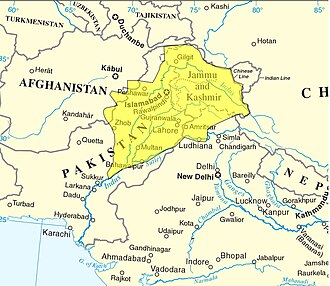Sikhs
Ethnoreligious group originating from the Punjab region of the Indian subcontinent







The Sikhs are an ethnoreligious group originating from the Punjab region of the Indian subcontinent. They adhere to Sikhism, a monotheistic religion founded in the late 15th century by Guru Nanak. The term "Sikh" means "disciple" or "learner" in Punjabi.
History[edit]
The history of the Sikhs began with the birth of Guru Nanak in 1469. He was the first of the ten Sikh Gurus who shaped the religion and its practices. The last of the ten human Gurus, Guru Gobind Singh, established the Khalsa in 1699, a collective body of initiated Sikhs. After his death, the Guru Granth Sahib, the holy scripture of Sikhism, was declared the eternal Guru.
Beliefs and Practices[edit]
Sikhs believe in one God and the teachings of the ten Gurus, enshrined in the Guru Granth Sahib. Key practices include daily prayers, community service, and the pursuit of justice and equality. The Five Ks are five articles of faith that baptized Sikhs are required to wear at all times.
Demographics[edit]
Sikhs primarily reside in the Punjab state of India, but significant populations exist in countries such as Canada, the United Kingdom, the United States, and Australia. The global Sikh population is estimated to be between 25 to 30 million.
Culture[edit]
Sikh culture is rich and diverse, with a strong emphasis on community and service. The langar, a community kitchen, is a hallmark of Sikh hospitality, providing free meals to all visitors regardless of their background. Sikh festivals such as Vaisakhi and Gurpurab are celebrated with great fervor.
Notable Sikhs[edit]
Prominent Sikhs include Bhagat Singh, a revolutionary freedom fighter, and Manmohan Singh, the former Prime Minister of India. Sikhs have also made significant contributions in various fields such as sports, arts, and business.
Related Pages[edit]

This article is a Sikhism-related stub. You can help WikiMD by expanding it!
Ad. Transform your life with W8MD's Budget GLP-1 injections from $49.99


W8MD offers a medical weight loss program to lose weight in Philadelphia. Our physician-supervised medical weight loss provides:
- Weight loss injections in NYC (generic and brand names):
- Zepbound / Mounjaro, Wegovy / Ozempic, Saxenda
- Most insurances accepted or discounted self-pay rates. We will obtain insurance prior authorizations if needed.
- Generic GLP1 weight loss injections from $49.99 for the starting dose of Semaglutide and $65.00 for Tirzepatide.
- Also offer prescription weight loss medications including Phentermine, Qsymia, Diethylpropion, Contrave etc.
NYC weight loss doctor appointmentsNYC weight loss doctor appointments
Start your NYC weight loss journey today at our NYC medical weight loss and Philadelphia medical weight loss clinics.
- Call 718-946-5500 to lose weight in NYC or for medical weight loss in Philadelphia 215-676-2334.
- Tags:NYC medical weight loss, Philadelphia lose weight Zepbound NYC, Budget GLP1 weight loss injections, Wegovy Philadelphia, Wegovy NYC, Philadelphia medical weight loss, Brookly weight loss and Wegovy NYC
|
WikiMD's Wellness Encyclopedia |
| Let Food Be Thy Medicine Medicine Thy Food - Hippocrates |
Medical Disclaimer: WikiMD is not a substitute for professional medical advice. The information on WikiMD is provided as an information resource only, may be incorrect, outdated or misleading, and is not to be used or relied on for any diagnostic or treatment purposes. Please consult your health care provider before making any healthcare decisions or for guidance about a specific medical condition. WikiMD expressly disclaims responsibility, and shall have no liability, for any damages, loss, injury, or liability whatsoever suffered as a result of your reliance on the information contained in this site. By visiting this site you agree to the foregoing terms and conditions, which may from time to time be changed or supplemented by WikiMD. If you do not agree to the foregoing terms and conditions, you should not enter or use this site. See full disclaimer.
Credits:Most images are courtesy of Wikimedia commons, and templates, categories Wikipedia, licensed under CC BY SA or similar.
Translate this page: - East Asian
中文,
日本,
한국어,
South Asian
हिन्दी,
தமிழ்,
తెలుగు,
Urdu,
ಕನ್ನಡ,
Southeast Asian
Indonesian,
Vietnamese,
Thai,
မြန်မာဘာသာ,
বাংলা
European
español,
Deutsch,
français,
Greek,
português do Brasil,
polski,
română,
русский,
Nederlands,
norsk,
svenska,
suomi,
Italian
Middle Eastern & African
عربى,
Turkish,
Persian,
Hebrew,
Afrikaans,
isiZulu,
Kiswahili,
Other
Bulgarian,
Hungarian,
Czech,
Swedish,
മലയാളം,
मराठी,
ਪੰਜਾਬੀ,
ગુજરાતી,
Portuguese,
Ukrainian
- Sikhism
- Ethnoreligious groups
- Punjabi people
- Indian people
- Pakistani people
- Religion in India
- Religion in Pakistan
- Religion in Canada
- Religion in the United Kingdom
- Religion in the United States
- Religion in Australia
- Religion in Malaysia
- Religion in Italy
- Religion in the United Arab Emirates
- Religion in New Zealand
- Sikhism stubs